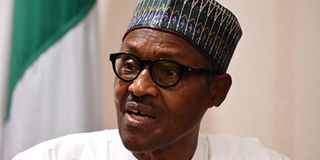How Nigeria and its president are being held to ransom

Nigerian President Muhammadu Buhari. PHOTO | PIUS UTOMI EKPEI | AFP
What you need to know:
- Even one of the president's relations is currently being held after he was seized from outside his house earlier this month by gunmen.
- In March, a Muslim cleric in Kano, who campaigned for Mr Buhari ahead of his re-election, was held for 12 days by kidnappers.
- Before a World Cup match last year, Nigeria and Middlesbrough footballer John Mikel Obi was told that his father had been abducted.
The pomp and ceremony of Muhammadu Buhari's inauguration will not mask the huge challenges the 76-year-old Nigerian president faces during his second term in office - in particular the booming business of kidnapping for ransom.
RANSOM
Even one of the president's relations - a traditional ruler in Daura in northern Nigeria - is currently being held after he was seized from outside his house earlier this month by gunmen.
In March, a well-known Muslim cleric in Kano, who campaigned for Mr Buhari ahead of his re-election, was held for 12 days by kidnappers demanding $833,000 (£657,000) for his release.
"Eight young men were assigned to guard us. They would smoke cigarettes and marijuana and blow the smoke into the hut, abusing and threatening to kill us since our people didn't care to bring the ransom in time. They issued all sorts of threats," Ahmed Sulaiman told the Daily Trust newspaper, adding that his freedom was secured as part of a prisoner swap.
DEATH THREATS
Gangs nationwide kidnap both rich and poor people, often collecting ransoms of up to $150,000 - and sometimes killing abductees whose families fail to pay.
Before a World Cup match last year, Nigeria and Middlesbrough footballer John Mikel Obi was told that his father had been abducted for a second time, and threatened with death.
"I thought that after the match I would probably find out they had decided to shoot him," he said. He reportedly paid $28,000 for his father's release.
A major highway out of Abuja, linking the capital to the city of Kaduna, has become so notorious for kidnapping that many travellers are opting to board trains instead, even though the service to Kaduna is limited and racketeers are selling tickets to commuters at inflated prices.
SYNDICATE
A top ruling party politician and his daughter were abducted on the highway in April, and their driver was shot dead at the scene. Relatives told the BBC that a ransom was paid to free them.
What started as a money-making scheme about 15 years ago in the southern Niger Delta with the kidnapping of oil workers has mushroomed across the country.
Syndicates have also been taking a leaf out of Boko Haram's books by using the tactics of the Islamist militants to raid whole communities on motorcycles, making off with their leaders.
BOKO HARAM
When Mr Buhari took his oath of office in 2015, he promised to tackle the Boko Haram insurgency which has blighted the lives of hundreds of thousands of people in the north-east over the last decade.
The militants' power has diminished over the last four years, but they are still active. Many in the north-east remain homeless or in captivity, including more than 100 of the girls abducted from a school Chibok in 2014.
Now the high levels of insecurity elsewhere, especially in the north-western states of Zamfara, Kaduna and Katsina, has left many feeling terrorised.
The governor of Katsina, Mr Buhari's home state, told the BBC that he feared there would be a serious food crisis later this year because the fear of kidnapping was keeping so many farmers from their fields.





